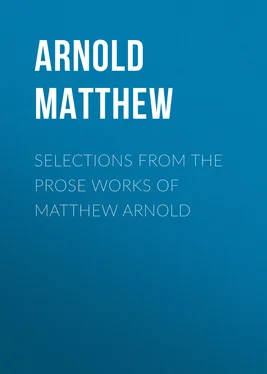Matthew Arnold - Selections from the Prose Works of Matthew Arnold
Здесь есть возможность читать онлайн «Matthew Arnold - Selections from the Prose Works of Matthew Arnold» — ознакомительный отрывок электронной книги совершенно бесплатно, а после прочтения отрывка купить полную версию. В некоторых случаях можно слушать аудио, скачать через торрент в формате fb2 и присутствует краткое содержание. Жанр: foreign_prose, literature_19, foreign_antique, на английском языке. Описание произведения, (предисловие) а так же отзывы посетителей доступны на портале библиотеки ЛибКат.
- Название:Selections from the Prose Works of Matthew Arnold
- Автор:
- Жанр:
- Год:неизвестен
- ISBN:нет данных
- Рейтинг книги:5 / 5. Голосов: 1
-
Избранное:Добавить в избранное
- Отзывы:
-
Ваша оценка:
- 100
- 1
- 2
- 3
- 4
- 5
Selections from the Prose Works of Matthew Arnold: краткое содержание, описание и аннотация
Предлагаем к чтению аннотацию, описание, краткое содержание или предисловие (зависит от того, что написал сам автор книги «Selections from the Prose Works of Matthew Arnold»). Если вы не нашли необходимую информацию о книге — напишите в комментариях, мы постараемся отыскать её.
Selections from the Prose Works of Matthew Arnold — читать онлайн ознакомительный отрывок
Ниже представлен текст книги, разбитый по страницам. Система сохранения места последней прочитанной страницы, позволяет с удобством читать онлайн бесплатно книгу «Selections from the Prose Works of Matthew Arnold», без необходимости каждый раз заново искать на чём Вы остановились. Поставьте закладку, и сможете в любой момент перейти на страницу, на которой закончили чтение.
Интервал:
Закладка:
I have said that the imitators of Shakespeare, fixing their attention on his wonderful gift of expression, have directed their imitation to this, neglecting his other excellences. These excellences, the fundamental excellences of poetical art, Shakespeare no doubt possessed them— possessed many of them in a splendid degree; but it may perhaps be doubted whether even he himself did not sometimes give scope to his faculty of expression to the prejudice of a higher poetical duty. For we must never forget that Shakespeare is the great poet he is from his skill in discerning and firmly conceiving an excellent action, from his power of intensely feeling a situation, of intimately associating himself with a character; not from his gift of expression, which rather even leads him astray, degenerating sometimes into a fondness for curiosity of expression, into an irritability of fancy, which seems to make it impossible for him to say a thing plainly, even when the press of the action demands the very directest language, or its level character the very simplest. Mr. Hallam, 17 17 ~Henry Hallam~ (1777-1859). English historian. See his Introduction to the Literature of Europe in the Fifteenth, Sixteenth and Seventeenth Centuries , chap. 23, §§ 51, 52.
than whom it is impossible to find a saner and more judicious critic, has had the courage (for at the present day it needs courage) to remark, how extremely and faultily difficult Shakespeare's language often is. It is so: you may find main scenes in some of his greatest tragedies, King Lear , for instance, where the language is so artificial, so curiously tortured, and so difficult, that every speech has to be read two or three times before its meaning can be comprehended. This over-curiousness of expression is indeed but the excessive employment of a wonderful gift—of the power of saying a thing in a happier way than any other man; nevertheless, it is carried so far that one understands what M. Guizot 18 18 ~François Pierre Guillaume Guizot~ (1787-1874), historian, orator, and statesman of France.
meant when he said that Shakespeare appears in his language to have tried all styles except that of simplicity. He has not the severe and scrupulous self-restraint of the ancients, partly, no doubt, because he had a far less cultivated and exacting audience. He has indeed a far wider range than they had, a far richer fertility of thought; in this respect he rises above them. In his strong conception of his subject, in the genuine way in which he is penetrated with it, he resembles them, and is unlike the moderns. But in the accurate limitation of it, the conscientious rejection of superfluities, the simple and rigorous development of it from the first line of his work to the last, he falls below them, and comes nearer to the moderns. In his chief works, besides what he has of his own, he has the elementary soundness of the ancients; he has their important action and their large and broad manner; but he has not their purity of method. He is therefore a less safe model; for what he has of his own is personal, and inseparable from his own rich nature; it may be imitated and exaggerated, it cannot be learned or applied as an art. He is above all suggestive; more valuable, therefore, to young writers as men than as artists. But clearness of arrangement, rigor of development, simplicity of style—these may to a certain extent be learned: and these may, I am convinced, be learned best from the ancients, who, although infinitely less suggestive than Shakespeare, are thus, to the artist, more instructive.
What then, it will be asked, are the ancients to be our sole models? the ancients with their comparatively narrow range of experience, and their widely different circumstances? Not, certainly, that which is narrow in the ancients, nor that in which we can no longer sympathize. An action like the action of the Antigone of Sophocles, which turns upon the conflict between the heroine's duty to her brother's corpse and that to the laws of her country, is no longer one in which it is possible that we should feel a deep interest. I am speaking too, it will be remembered, not of the best sources of intellectual stimulus for the general reader, but of the best models of instruction for the individual writer. This last may certainly learn of the ancients, better than anywhere else, three things which it is vitally important for him to know:—the all-importance of the choice of a subject; the necessity of accurate construction; and the subordinate character of expression. He will learn from them how unspeakably superior is the effect of the one moral impression left by a great action treated as a whole, to the effect produced by the most striking single thought or by the happiest image. As he penetrates into the spirit of the great classical works, as he becomes gradually aware of their intense significance, their noble simplicity, and their calm pathos, he will be convinced that it is this effect, unity and profoundness of moral impression, at which the ancient poets aimed; that it is this which constitutes the grandeur of their works, and which makes them immortal. He will desire to direct his own efforts towards producing the same effect. Above all, he will deliver himself from the jargon of modern criticism, and escape the danger of producing poetical works conceived in the spirit of the passing time, and which partake of its transitoriness.
The present age makes great claims upon us: we owe it service, it will not be satisfied without our admiration. I know not how it is, but their commerce with the ancients appears to me to produce, in those who constantly practise it, a steadying and composing effect upon their judgment, not of literary works only, but of men and events in general. They are like persons who have had a very weighty and impressive experience; they are more truly than others under the empire of facts, and more independent of the language current among those with whom they live. They wish neither to applaud nor to revile their age: they wish to know what it is, what it can give them, and whether this is what they want. What they want, they know very well; they want to educe and cultivate what is best and noblest in themselves: they know, too, that this is no easy task—[Greek: Chalepon] as Pittacus 19 19 ~Pittacus~, of Mytilene in Lesbos (c. 650-569 B.C.), was one of the Seven Sages of Greece. His favorite sayings were: "It is hard to be excellent" ([Greek: chalepon esthlon emenai]), and "Know when to act."
said,[Greek: Chalepon esthlonemmenai]—and they ask themselves sincerely whether their age and its literature can assist them in the attempt. If they are endeavoring to practise any art, they remember the plain and simple proceedings of the old artists, who attained their grand results by penetrating themselves with some noble and significant action, not by inflating themselves with a belief in the preëminent importance and greatness of their own times. They do not talk of their mission, nor of interpreting their age, nor of the coming poet; all this, they know, is the mere delirium of vanity; their business is not to praise their age, but to afford to the men who live in it the highest pleasure which they are capable of feeling. If asked to afford this by means of subjects drawn from the age itself, they ask what special fitness the present age has for supplying them. They are told that it is an era of progress, an age commissioned to carry out the great ideas of industrial development and social amelioration. They reply that with all this they can do nothing; that the elements they need for the exercise of their art are great actions, calculated powerfully and delightfully to affect what is permanent in the human soul; that so far as the present age can supply such actions, they will gladly make use of them; but that an age wanting in moral grandeur can with difficulty supply such, and an age of spiritual discomfort with difficulty be powerfully and delightfully affected by them.
Интервал:
Закладка:
Похожие книги на «Selections from the Prose Works of Matthew Arnold»
Представляем Вашему вниманию похожие книги на «Selections from the Prose Works of Matthew Arnold» списком для выбора. Мы отобрали схожую по названию и смыслу литературу в надежде предоставить читателям больше вариантов отыскать новые, интересные, ещё непрочитанные произведения.
Обсуждение, отзывы о книге «Selections from the Prose Works of Matthew Arnold» и просто собственные мнения читателей. Оставьте ваши комментарии, напишите, что Вы думаете о произведении, его смысле или главных героях. Укажите что конкретно понравилось, а что нет, и почему Вы так считаете.












